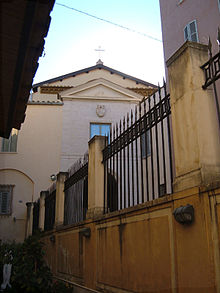Friezenkerk
| Church of St. Michael and St. Magnus Chiesa dei Santi Michele e Magno (Italian) Friezenkerk (Dutch) |
|
|---|---|
 |
|
| Basic information | |
| Location | Rome, Italy |
| Geographic coordinates | 41°54′5.26″N 12°27′32.26″E / 41.9014611°N 12.4589611°ECoordinates: 41°54′5.26″N 12°27′32.26″E / 41.9014611°N 12.4589611°E |
| Affiliation | Roman Catholic |
| Country | Italy |
| Ecclesiastical or organizational status | National Church in Rome of the Netherlands |
| Leadership | P. Tiemen J. S. Brouwer |
| Website | www |
| Architectural description | |
| Architect(s) | François Desjardins |
| Architectural type | Church |
| Architectural style | Baroque |
| Groundbreaking | 1141 |
| Specifications | |
| Length | 28 metres (92 ft) |
| Width | 12 metres (39 ft) |
| Height (max) | 20 metres (66 ft) |
The Church of Saints Michael and Magnus (Italian: Santi Michele e Magno, Dutch: Friezenkerk) is a Roman Catholic church in Rome, Italy, dedicated to Saint Michael the Archangel and the Bishop Saint Magnus of Anagni. It lies in Rione Borgo, and is the national church dedicated to the Netherlands. It is also known as the "Church of the Frisians" (Dutch: Kerk van de Friezen). In 1989, the church was granted to the Dutch community in Rome.
The Frisians were converted to Christianity in the 8th century by Saint Willibrord, known as the "Apostle to the Frisians" in the modern Netherlands. The Northumbrian missionary crossed the North Sea with eleven companions to bring the Gospel. From that time on, Frisian pilgrims regularly visited Rome. The old name for the people from the Low Countries who came to Rome has remained in use ever since.
A colony of Frisians was living in Rome as early as the 8th century. The Schola of the Frisians is mentioned at the time of Pope Leo III's return to Rome in 799, at Charlemagne's visit in 800 and by Louis II of Italy in 844. In 845, the Frisians and the inhabitants of the other scholae defended Old St. Peter's Basilica and its neighborhood against a Saracen invasion. The schola was plundered nonetheless. Shortly after, the neighborhood was surrounded by a wall, remains of which can still be seen. Any pilgrim from the Frisian territory who came to Rome would stay in the Frisian hospice, the closest to the St Peter's.
...
Wikipedia
